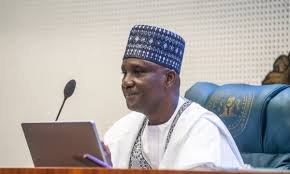
Daniel Otera
As Nigeria marked Democracy Day on 12 June, Speaker of the House of Representatives, Tajudeen Abbas, reaffirmed a legislative ambition: to complete the constitutional amendment process by December 2025 with gender inclusion among the top priorities.
Speaking at a joint session of the 10th National Assembly in Abuja, Abbas declared that lawmakers were “leaving no stone unturned” in their push to reform key aspects of the 1999 Constitution, particularly those relating to gender representation and the role of traditional institutions.
“While we celebrate our successes, we remain acutely aware that it is not yet Uhuru,” the Speaker stated. “Our determination is unequivocal to expedite and finalise the constitutional amendment process by December 2025.”
One of the most ambitious proposals under review is the creation of reserved legislative seats for women across all tiers of government, a move that could mark a turning point in Nigeria’s struggle for gender parity in politics.
Despite women accounting for nearly half of Nigeria’s population, their political representation remains abysmally low. Following the 2023 general elections, only 17 women were elected to the National Assembly comprising 3 Senators and 14 House members out of 469 total seats. That represents a mere 3.6% representation at the federal legislative level.
At the state level, the numbers are similarly poor. Of the 1,019 female candidates who contested seats in the 36 state Houses of Assembly, only 48 were elected, translating to a 4.8% success rate. In total, women now hold just 4.85% of the 988 available seats in state legislatures.

According to the Policy and Legal Advocacy Centre (PLAC), this reflects persistent gender imbalances that undermine inclusive governance. Civic groups have echoed these concerns, describing the current trajectory as a major setback for Nigeria’s democratic ideals.
The 2024 Inter-Parliamentary Union (IPU) report ranks Nigeria 178th out of 182 countries globally for female parliamentary representation third-worst in Africa, ahead of only Eritrea and Niger Republic.
To tackle this imbalance, a constitutional amendment bill passed second reading in the House of Representatives in July 2024. The bill proposes the creation of special seats for women: one Senate and one House of Representatives seat for each of the 36 states and the Federal Capital Territory (FCT), totalling 74 seats.
It also mandates three additional seats per state in the Houses of Assembly, to be filled through direct elections in designated female-only constituencies.
Crucially, this is not a quota within party primaries, but a constitutional guarantee of female representation reviewable after 16 years, as a transitional mechanism to address systemic barriers to women’s political participation.
Speaker Abbas also revealed that lawmakers intend to enshrine a 35% affirmative action clause in the Constitution, giving legal force to a policy that has long lacked enforceability.
The broader constitutional reform package will also propose formal roles for traditional rulers, reflecting a shift in Nigeria’s federal governance architecture.
Global precedents underscore the value of intentional gender-inclusive governance.
In Rwanda, women hold 61.3% of parliamentary seats thanks to a 2003 constitutional quota. This transformation has coincided with gains in maternal health, gender-based violence legislation, and girls’ education.
In Senegal, the 2010 Law on Parity requires alternating male-female candidates on party lists, raising women’s representation from 22% to over 40%.
In South Africa, the ruling African National Congress (ANC) enforces a 50% internal quota, while the Economic Freedom Fighters (EFF) apply a “zebra” system (alternating genders on candidate lists). Women now occupy 45% of the National Assembly seats.
Bolivia, following parity reforms in 2010, achieved over 50% female representation in both houses of parliament.
According to UN Women and the International Institute for Democracy and Electoral Assistance, these policies not only improve representation but also lead to more inclusive, responsive, and equitable policymaking.
These examples also counter the argument that gender quotas undermine merit. Instead, they show how institutional barriers can be structurally dismantled to allow fairer access to opportunity.
Nigeria’s proposed reforms come at a critical time. Amid economic volatility, security concerns, and public sector reforms, gender inclusion is emerging as a litmus test for democratic maturity.
If passed, the gender inclusion amendment would not only correct a longstanding injustice but could also position Nigeria as a continental leader in democratic innovation.
However, the road ahead is fraught with challenges. Nigeria has a track record of failed attempts to pass gender equality legislation. In March 2022, the National Assembly rejected five gender-related bills during its constitutional review process.
These included proposals for special seats for women, 35% affirmative action in political appointments, and increased female participation in party politics.
According to reports from ActionAid Nigeria, Women Advocates Research and Documentation Centre (WARDC), and other civic groups, the bills were defeated largely due to entrenched patriarchal norms, cultural resistance, and lack of political will among the male-dominated legislature. Lawmakers opposing the bills often cited religious and traditional values, with some claiming the proposals conflicted with religious texts.
This repeated rejection of gender reform has drawn public outcry and protests from civil society organisations, who argue that the decisions undermine inclusive governance and democratic equity.
As the current National Assembly reconsiders gender inclusion, the stakes are higher and the potential for lasting democratic impact even greater. After 26 years of uninterrupted civilian rule, the question is no longer whether women can lead, but whether Nigeria is prepared to dismantle the barriers that prevent them from doing so.
